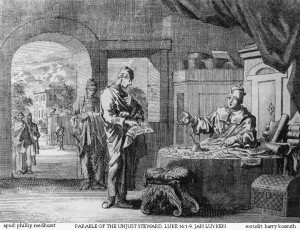Thoughts on Today’s Lessons for Sept. 18, 2016
First Reading: Jeremiah 8:18-9:1The prophet Jeremiah grieves, because the people are breaking God’s covenants: They’re not being righteous; they’re not caring for the poor, widows, orphans, or strangers in their land. And Jeremiah knows this will lead them to destruction and exile. In beautifully poetic words of sadness, the prophet mourns deeply, imagining God’s own mourning. “Is there no balm in Gilead?”
First Reading (Track Two): Amos 8:4-7
If any one message resounds loud, clear and consistently through all the prophets, it is this: The people made covenant with God to deal fairly with the hungry, the thirsty, the sick, aliens and and all in need. If we try to cheat on this agreement, trample the needy and ruin the poor in pursuit of profit, Amos warns, God will grow righteously angry, and the people will not like the consequences.
Today’s Psalm mourns for desolate and shattered Jerusalem after the Exile, echoing Jeremiah’s weeping prophesy of the destruction that he saw coming. Jerusalem is rubble. The unburied bodies of martyred faithful are food for birds and beasts; their blood runs like water around the city. The people are the objects of scorn, and they feel only God’s fury blazing like fire. The Psalm ends with prayers for God’s mercy and forgiveness, but we don’t hear God’s answer here.
Psalm (Track Two): Psalm 113
Today’s Psalm of praise for God’s glory seems to answer the question that Amos raised in the First Reading: The Lord looks down from a seat high above the nations, sees humanity and gently reaches down to lift up the needy, the poor and the disappointed. Take care, however, not to read this as reason to leave the weak and the oppressed to God’s efforts. Amos has already told us what God thinks of that!
Second Reading: 1 Timothy 2:1-7
These verses tell us that there are four different ways to pray: Supplications (specific requests of God through Jesus as mediator between God and humankind); prayers (simple conversation with God); intercessions (calls for God’s help in urgent need); and finally, thanksgiving (expressing our gratitude for favors received). We should pray for everyone, family, friends and neighbors, and kings and leaders too, for high and low alike need God’s help, and God desires to bring everyone to the truth and salvation.
Gospel: Luke 16:1-13
Jesus’ parables often seem confusing, and that may be their point: Jesus does not spoon-feed us but rather makes us think; so when we finally get the point, we’ve learned something. In today’s Gospel, it might seem that Jesus is telling us that the dishonest steward’s trickery is a good thing. After all, the rich man rewards him! But remember that Jesus does not admire the rich. He usually holds them up as bad examples. Indeed, he hammers home his simple point: If you’re dishonest about wealth, you can’t be trusted with truly valuable things. We must choose between God and wealth. In Jesus’ mind, we can’t have both.

